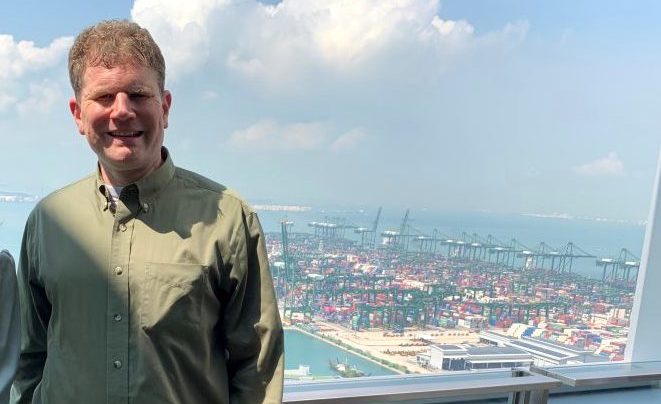FMC Commissioner Maffei supports development of national port information-sharing system

Federal Maritime Commission chairman Daniel Maffei has joined Port of Los Angeles executive director Gene Seroka on a webinar to discuss challenges facing the maritime industry.
Maffei noted that the FMC has a “pretty limited set of tools” it can use to help exporters with the high prices they are having to pay for containers. For exporters, he said, it’s a very frustrating time: “The cost of a container has gone way up and the ability to get equipment has gone way down.”
In addition to the Fact Finding No. 29 initiative led by commissioner Rebecca Dye – originally an investigation to identify operational solutions to cargo delivery system challenges related to Covid-19, later expanded to include investigation of ocean carriers operating in alliances and calling the Ports of Long Beach, Los Angeles, and New York and New Jersey – which Maffei described as a “fully comprehensive enforcement investigation,” Maffei wants to see the FMC do more for exporters. He said he plans to recommend three items to the Commission:
- To have a go-to person at the FMC, possibly someone in the organisation’s Consumer Response Division, to help exporters understand “what the law is and what, if anything, is being done wrongly on the other side.”
- To have continued, enhanced enforcement where exporters are denied containers, “where there is something unreasonable” happening.
- To have another look at the FMC’s D&D rules: Are there areas that can be strengthened, specifically for exporters?
On the topic of infrastructure, Maffei said the nation’s maritime system “needs a great deal” and that the need is long-standing. As the country’s gateways for global trade, he emphasised, ports shouldn’t have to scrounge to get access to the funds they need. To increase exports, infrastructure issues must be dealt with – for example, the high cost to get containers from interior farmlands to the ports and onto ships is related to infrastructure challenges. He believes US ports are performing very well, given the level of support they’ve had.
Infrastructure to enable the improved flow of information would be good, he noted, for the whole supply chain system, particularly through the import boom the country has been experiencing during the pandemic.
On the same subject, Seroka said, “There are plenty of containers, they’re just not in the right location.”
A nationwide port information-sharing system would go a long way to alleviating that problem, he said. Maffei agreed, and noted, “That’s certainly not a Democratic thing, because Rebecca Dye has been advocating it for at least a decade now.” (Dye is a Republican-appointed commissioner.) Maffei explained, as well, that in the complex system of global trade, container availability is just part of the current problem.
Regarding D&D charges, Maffei said the FMC’s role is to provide deterrents, primarily fines, to unreasonably high costs. He noted that the deterrent effect is hard to measure, but he has a “well-grounded hope” that things are improving.
